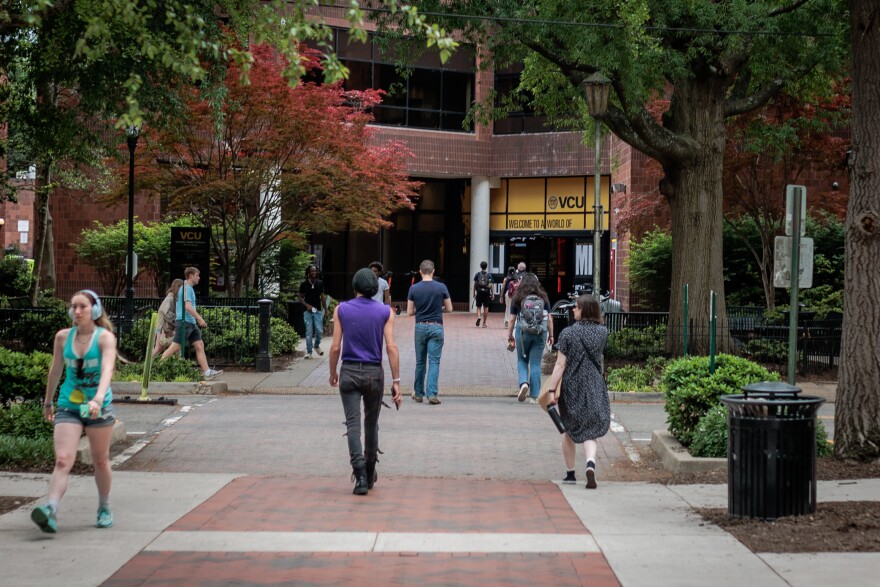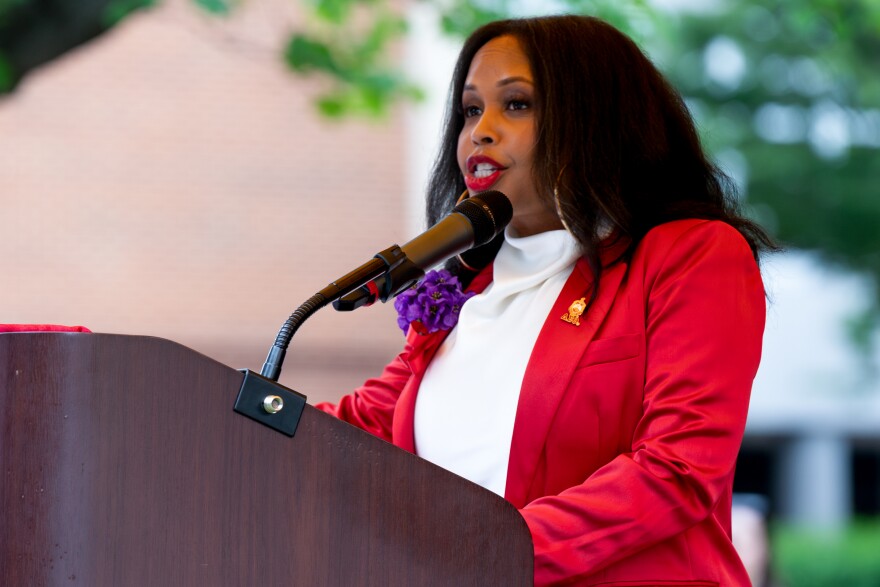Virginia Commonwealth University’s leadership and its Board of Visitors continue to receive pushback about the school’s recent anti–DEI actions from faculty and alumni.
VCU’s most recent actions follow the board’s March 21 vote to eliminate the Division of Inclusive Excellence; its former staff told VPM News the bulk of the division’s work centered on workshops and discussions about how to be more inclusive and how to handle conflict. They also cosponsored events with VCU’s On Native Ground initiative, among other collaborations across the university.
“We had really developed a good group here,” said VCU anthropology professor Christopher Brooks, who also served as a faculty adviser to the division. “There was no instance at all of discrimination or exclusivity or anything like that.”
Brooks weighed in on a variety of issues regarding staffing, recruitment, and development of the office’s programming. He’d helped develop a speaker series called Diversity in Action; the first session last fall was about his recent book, Tales of Koehler Hollow, and the third installment was slated for this upcoming fall. Now, the fate of this series is unknown.
Brooks, who has taught at VCU for the past 35 years, said it seems like there’s been “open season” on the term diversity. Though, he added that stopping the university’s progress in inclusiveness altogether would be incredibly difficult.
“It's kind of like trying to put toothpaste back in the tube,” he said. “We have had several generations that have grown up feeling more inclusive, expecting that to be the case.”
The same day the board voted to dissolve the Division of Inclusive Excellence, Valerie Robnolt shared a resolution from VCU’s Faculty Senate stating that nothing the university was doing was discriminatory — and therefore, she said, no action from the BOV was necessary.

During the board’s May 9 meeting, Robnolt reiterated that message in a joint statement from VCU’s staff and faculty senates that called for shared governance with the board — something that past annual reports have highlighted.
“It's still not a complete reality to have true shared governance and that's what we're asking for,” Robnolt told VPM News. “When there are decisions being made that have a direct impact on the constituents of the university — that we are involved in the decision-making process."
In early April, the university’s Black Education Association sent a letter to President Michael Rao and other senior administrators asking VCU to hold a town hall or community forum to address the community’s concerns about board actions. The letter also requested the establishment of a task force with BEA representation to ensure the student body’s continued success and well-being.
BEA President Charlene Crawley said the university’s speedy elimination of its Inclusive Excellence office was “an injustice to our students.” She also believed the decision was made before the board’s March 21 meeting to dissolve the unit was held.
“They’re not caring about the students that they are supposed to serve,” Crawley said. “And it not only angers me, but it hurts my heart how they could do this without a struggle.”
Crawley, who has been a VCU faculty member for 30 years, said knowing the history of the university’s dedication to attracting, educating and inspiring marginalized students made the decision even more surprising. She said the university has also done a lot to ensure teaching evaluations aren’t biased against women and people of color as studies have found they’ve often been.
“I cannot express what I’m feeling,” Crawley told VPM News. “I think a lot of people have just been hoodwinked.”
She said workshops that address faculty, staff and student concerns have been the norm at VCU for years. According to her, those have been designed to prevent discrimination and isolation like what she experienced while completing her doctorate at the University of Delaware in the early 1980s, where she said she was around very few other Black people.
“I would be in the classroom and raise my hand to talk, and the class would become quiet,” Crawley said. “I thought I was on another planet.”
That’s why she said she was shocked to hear that a VCU student she was mentoring had a similar experience in another state about five years ago.
“It was demoralizing. She felt invisible,” Crawley said. “The research group she was in was more interested in questions about, ‘How did she get her hair like that?’ than in bringing her in on research discussions.”
The BEA’s letter also asked how VCU planned to “preserve the services that have been eliminated” in the diversity and inclusion space, while addressing rising emotions of “fear, anguish, anger and uncertainty” from students.
Crawley said she had not yet received a response as of May 12. Though Crawley, like Brooks, is optimistic that the dismantling of certain programs won’t be as damaging at VCU compared to some other institutions.
“Because I think, at heart, we have embraced the philosophy of inclusion,” Crawley said.

Sesha Joi Moon, a VCU alum and former DEI director for the US House of Representatives, also publicly criticized the university over its decision to dissolve the Division of Inclusive Excellence during an April memorial dedication for her sorority.
“Our beloved campus — our homepage — says VCU is a disruptor that's not here to follow the beaten path, but rather to blaze a new one by pushing boundaries in higher education and health care,” she said. “VCU has been slowly distancing itself from this identity, and it's really sad to watch.”
Moon also called for the establishment of a working group, this one to help steer revisions to VCU’s goal of “Diversity Driving Excellence” as part of its strategic plan Quest 2028: One VCU Together We Transform. She requested a meeting with Rao’s office to discuss any disparate impacts on historically underserved or underrepresented groups of students, faculty and/or alumni — in addition to a regular meeting series between the president’s office and VCU’s Black Alumni Council and National Pan-Hellenic Council.
On Monday, Moon sent VPM News a statement after she met with Rao to discuss concerns and a path forward, calling the meeting "an honest hour spent and a good step in the right direction."
"And while my disappointment in the Board of Visitors' decision to dismantle inclusive excellence has been publicly stated and remains unchanged," Moon's statement read, "I did walk away from our meeting feeling optimistic about a path forward that will help to sustain the university's commitment to cultivating a campus culture that embodies a sense of belonging among all students — to include historically underrepresented students, as well as staff, faculty, and alumni whose lived experiences have generally operated along the margin."
Moon added that the Dr. Sesha Joi Moon Endowed Scholarship Fund, which was established in 2024 through the L. Douglas Wilder School of Government and Public Affairs, will continue "as originally envisioned."
In response to VPM News questions about BEA and Moon’s calls, Mike Porter, associate vice president of public relations, sent an emailed statement:
“[T]he president and other senior leaders have updated the community regularly through emails and have spoken regularly and openly with multiple groups including Faculty Senate, Staff Senate, Council of Deans, University Council, Board of Visitors about the dissolution of IES and the role VCU continues to play in preparing our students for success and our continued commitment to providing support services to our students.”



